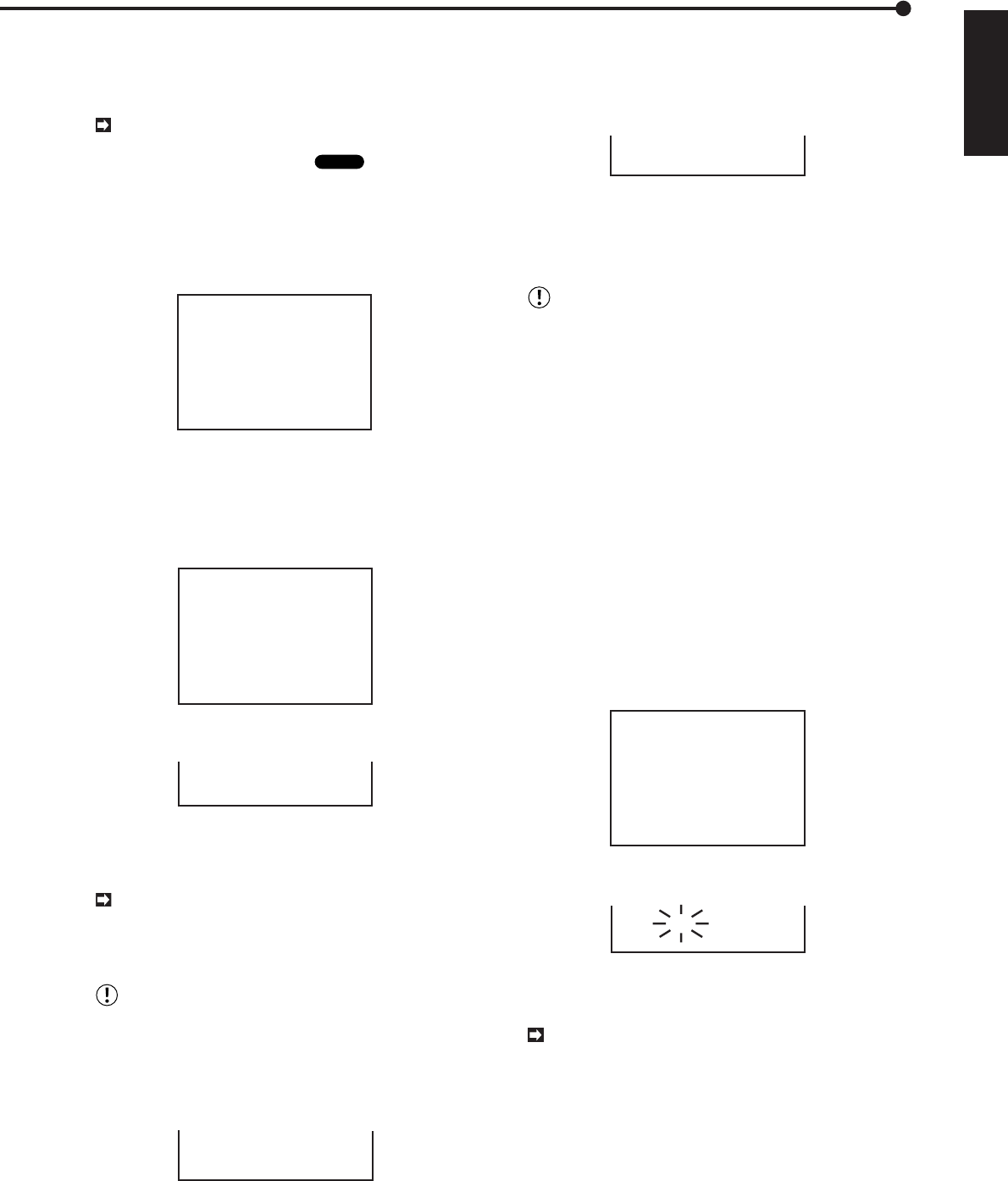
19
••••••••••••••••••••••••••••••••••••••••••••••••••••••••••••••••••••••••••••••••••••••••••••••••••••••••••••••••••
Initial settings
ENGLISH
Initial settings
■ When to install the extra hard disk drive or
change the ID number
Example: When to install the 9GB hard disk drive to ID1.
When the power of the unit is turned on , the unit
will automatically detect peripheral recording devices
connected to its SCSI terminal
Glossary
. The system
must be initialized each time hard disks are added or
erased, connections are made, ID numbers are altered,
etc.
1. Press the POWER button.
• If the change is recognized, the screen below will appear.
<DEVICE CHECK>
SCSI ID0:HDD(30GB)
ID1:HDD( 9GB)
ID2:NONE
ID3:NONE
ID4:NONE
ID5:NONE
@PWR-OFF INITIALIZE
BOOT UP DELAY 00
2. Make sure that the connected device is recognized correctly.
• If the connected device is not displayed correctly, make
sure that the cursor is set to POWER OFF and turn the
SHUTTLE ring twice to the right. The power of this unit will
be turned off. Make sure that the connection of the external
device and the setting of the SCSI ID number is correct.
<DEVICE CHECK>
SCSI ID0:HDD(30GB)
ID1:HDD( 9GB)
ID2:NONE
ID3:NONE
ID4:NONE
ID5:NONE
@PWR-OFF INITIALIZE
BOOT UP DELAY 00
3. Turn the JOG dial to select INITIALIZE.
ID5:NONE
PWR-OFF @INITIALIZE
BOOT UP DELAY 00
4. Turn the SHUTTLE ring to the right.
• Turn the SHUTTLE ring to the right when the “Turn the
SHUTTLE RING >> to EXECUTE.” is displayed.
The unit will initialize its system when data is erased
from either its built-in hard disk or hard disks connected
to ID0 through ID3. Data is not erased from hard disks
connected to ID4 and ID5.
If the screen below appears after performing Step
1, it is possible that there is either a poor connection,
overlapping SCSI ID numbers, or an error in SCSI ID
number settings. In this case, turn the SHUTTLE ring
twice in the clockwise direction. Main power to the unit
will turn off; please then check the connection and SCSI
ID settings.
ID4:RDD
ID5:DDS
@PWR-OFF
BOOT UP DELAY 00
■
When to remove the hard disk drive after
initializing the system
1. Press the POWER button.
• The screen below will appear. It will not appear when you
remove the DDS or RDD which is connected to ID4 or ID 5.
ID5:RDD
@PWR-OFF CONFIG.
BOOT UP DELAY 00
2. Make sure that the connected device is recognized correctly.
3. Turn the JOG dial to select “CONFIG.”, and turn the
SHUTTLE ring to the right twice.
When CONFIG. is selected, the unit will save the
data recorded on the connected peripheral recording
device (which has not been removed) as well as the
data recorded on the built-in HDD. Data recorded on a
removed peripheral recording device is not affected.
4. The unit will start setting up.
■ Setting the capacity limit of the hard disk drive
You cannot make a backup of all the recorded data at one
time if the recorded capacity of the hard disk drive is larger
than the capacity of the archive device medium. You can
set the limitation of the recorded capacity of the hard disk
drive in order to make a backup of all the recorded data at
one time.
Example: Setting the limitation of the hard disk drive ca-
pacity to 4GB.
1. Press the POWER button while pressing the REC button to
turn the power on.
• The <DEVICE CHECK> menu will appear.
<DEVICE CHECK>
SCSI ID0:HDD(30GB)
ID1:HDD( 9GB)
ID2:NONE
ID3:NONE
ID4:NONE
ID5:NONE
@LIMIT OFF INITIALIZE
BOOT UP DELAY 00
2.Turn the JOG dial to select LIMIT, and turn the SHUTTLE
ring to the right.
ID5:RDD
@LIMIT OFF INITIALIZE
BOOT UP DELAY 00
3. Turn the JOG dial to select the desired capacity, and turn
the SHUTTLE ring to the right to enter the selection.
The sub-items of the capacity limit are as follows:
“OFF”: The hard disk drive capacity will not be limited.
“2GB”, “4GB”, “12GB”, “25GB”: Limit recorded capac-
ity of HDD(hard disk drive) to 2GB, 4GB, 12GB, 25GB.
The CALL OUT signal will be emitted when the recorded
capacity reaches the preset amount.
You can set the capacity limit to “32GB” when you in-
stall the extra hard disk drive.


















